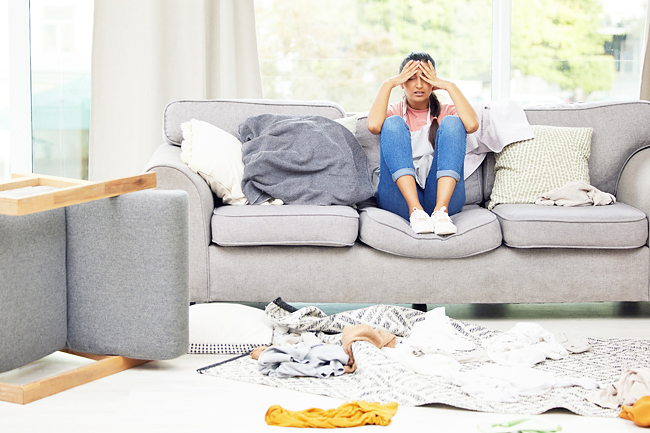Jandra Sutton
THE WASHINGTON POST – Chores are never really done. As soon as you cross the last item off your to-do list, a new task inevitably emerges. Dishes accumulate. Floors get dirty. The hamper fills up.
While the internet is full of hacks and shortcuts designed to make keeping a home easier and faster, what about a solution for the fatigue that sets in with endless household care?
This is the niche that KC Davis, licensed professional therapist and best-selling author of How to Keep House While Drowning, aims to fill – and she’s clearly hit a nerve. On TikTok, her compassionate and practical tips about chores and mental health have attracted 1.5 million followers. One of her most popular videos, “Why you don’t have to change who you are to have a functional home”, has 11.6 million views.
The Houston mum started divulging her own struggles balancing mental health and home care on social media a few years ago. It was early in the pandemic and her second child had just been born – it was an exhausting time. Today, she runs the mental health platform Struggle Care. She said she wants her followers to understand that a messy or cluttered home is nothing to be ashamed of. “I want people to stop taking care of their home and start trying to create a home that takes care of them,” she said, of her mission to change the conversation around cleaning. We asked her how to get started.
Why should people focus on creating a functional home, instead of a super clean one?
Davis defined a functional home as one that allows you and your family to live and operate comfortably within it, not one that fits someone else’s definition of “clean”.
“Most of us see how we keep house as sort of a reflection of our worthiness as a person,” Davis said, which can make maintaining your home even more difficult. Whether you’re dealing with mental health issues, busy with work, taking care of kids or all of the above, Davis explains that not being able to “stay on top” of chores can create a feedback loop.
Once you fall behind, it often makes you feel like you’re not good enough – which can make it harder for you to get started again.
Instead, Davis recommended shifting your perspective. “Space is just space,” she said. “I want to get out of the ‘performance’ of housekeeping.”

What should you do if you feel like you can’t keep up with the bare minimum?
If everything feels overwhelming – if the kitchen sink and counters are constantly piled with dishes, or your kids’ toys have become tripping hazards all over the house – Davis recommended identifying “closing duties”.
Pick one to five things – such as loading the dishwasher, wiping down the counters or making the bed – that you can do every day, whether first thing in the morning or right before you go to sleep, that will help you function better tomorrow. “And don’t worry about anything else.”
Starting simple, she explained, is the key to not giving up. “We’re starting at a very different place than, like, most organisers or cleaners or whatever… because half of this is that mental, emotional battle,” she said. “You deserve to walk to the bathroom without tripping and falling. And that is enough for today.”
What if you’re maintaining a relatively clean house, but you’re struggling with clutter?
“I always recommend my five things tidying (method) as a great starting point because that is the tool for me that gets spaces livable the quickest,” Davis said. The approach involves focusing on five broad categories of items that end up in a messy room: trash, dishes, laundry, things with a place and things without a place.
By reducing the task of tidying up to these categories, Davis says you’ll feel less overwhelmed and more capable of tackling messes as they arise – no daunting, long-term commitment necessary. This is particularly helpful for people facing larger-than-usual messes, and Davis recommended starting with the trash. Gather it all into a single bag or pile, then move on to the next category: laundry. Don’t worry about leaving the room (like to take the trash out) until you’re done with each category – that way you don’t get distracted.
What if you’ve been keeping a very clean house, but you’re exhausted by it?
If you’re maintaining an organised home and feeling drained by the pressure to keep up, Davis encouraged “throwing out the rule book”, and reevaluating tasks that don’t serve a functional purpose for you – such as vacuuming daily, keeping appliances off the countertop or folding laundry before putting it in drawers.
While that last one in particular might sound controversial, Davis discovered that the traditional method of folding and sorting clean clothes didn’t work for her family, especially with two small children. She devised a “no-fold” laundry system instead, which involves sorting clothing into bins for each family member, then hanging the rest in a shared family closet. It now takes her only a few minutes to put away an entire load of laundry.
How do you decide what’s necessary for a functional space, vs what isn’t?
Davis emphasised that everyone’s definition of functional is different, but that it’s important to separate what actually impacts your ability to function, from the things that only feel like they might.
“Does it really impact my functioning if, like, I have some dirt and dust on the floor?” she asked, as an example. For some people, thinking about the floor in those terms is enough to help them realise it’s no big deal. For others, Davis acknowledged the answer might be different. “There’s always somebody when I say that, that’s like, okay, but the floor being clean is functional to me… because I can’t unsee it.”
In those cases, she suggested looking for other ways to “let go” of something in your space. If clean floors are really important to you, then maybe you can ease up on your rigid laundry routine.
“If you’re finding that you’re cleaning or keeping things up to perfection as a way of managing your anxiety,” she added, “you really do deserve better coping skills and better tools than that.”
What’s the biggest mistake people make when making these lifestyle changes?
“We go way too big, too quick,” Davis said. Instead, “we want to make the smallest functional change that we can”. A great way to do this? Focus on solving problems where they exist.
If your family members leave their shoes in a large pile by the front door, don’t mandate that everyone puts their shoes on a rack inside the closet, says Davis. Instead, choose a strategy that will feel more intuitive, such as putting a basket to hold shoes where the pile usually forms. Similarly, if you or someone in your household has a habit of leaving dirty laundry on a particular spot on the floor, move the hamper there.
What if someone in my household is reluctant to contribute?
Remember that there’s a difference between having a conversation and dictating a new system to someone – especially a domestic partner, advised Davis.
“People should not be making your life harder,” Davis acknowledged, “but it’s also not fair to… walk around and dictate to everybody else how they have to live in their homes.”
Have a conversation with your partner about the division of household labor, but remember that one person’s version of functionality is never going to be precisely the same as somebody else’s. “We have to have a conversation, sitting down, where both of us have agreed to come to the table and talk about this.”






